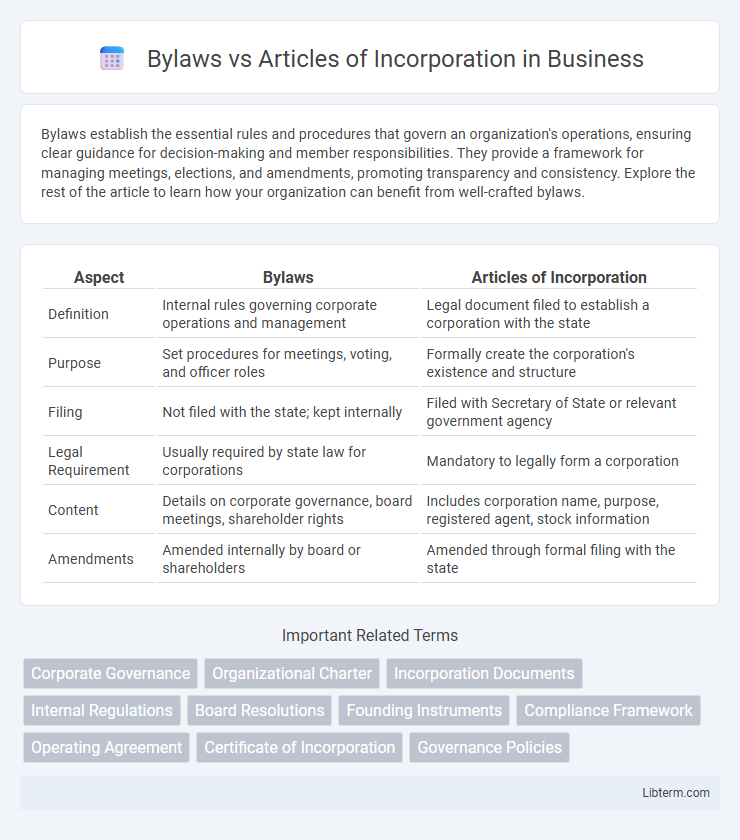Bylaws establish the essential rules and procedures that govern an organization's operations, ensuring clear guidance for decision-making and member responsibilities. They provide a framework for managing meetings, elections, and amendments, promoting transparency and consistency. Explore the rest of the article to learn how your organization can benefit from well-crafted bylaws.
Table of Comparison
| Aspect | Bylaws | Articles of Incorporation |
|---|---|---|
| Definition | Internal rules governing corporate operations and management | Legal document filed to establish a corporation with the state |
| Purpose | Set procedures for meetings, voting, and officer roles | Formally create the corporation's existence and structure |
| Filing | Not filed with the state; kept internally | Filed with Secretary of State or relevant government agency |
| Legal Requirement | Usually required by state law for corporations | Mandatory to legally form a corporation |
| Content | Details on corporate governance, board meetings, shareholder rights | Includes corporation name, purpose, registered agent, stock information |
| Amendments | Amended internally by board or shareholders | Amended through formal filing with the state |
Introduction to Bylaws and Articles of Incorporation
Bylaws establish the internal rules and governance structure of a corporation, detailing procedures for board meetings, officer roles, and shareholder rights. Articles of Incorporation, filed with the state, legally create the corporation and outline essential information such as the company name, purpose, registered agent, and stock structure. Together, these documents ensure compliance with state laws and provide a framework for corporate operations and accountability.
Definition: What Are Articles of Incorporation?
Articles of Incorporation are legal documents filed with a state government to officially establish a corporation's existence, detailing its name, purpose, registered agent, and stock information. These documents serve as a corporation's foundational charter, outlining basic structural and governance elements required for compliance. Unlike bylaws, which set internal rules, Articles of Incorporation provide public notice and legal recognition of the corporation.
Definition: What Are Corporate Bylaws?
Corporate bylaws are internal rules and procedures established by a corporation to govern its management and operations, detailing the rights and responsibilities of directors, officers, and shareholders. These written guidelines outline meeting protocols, election processes, and other administrative functions necessary for organizational structure. Bylaws differ from Articles of Incorporation, which are public documents filed with the state to legally create the corporation and define its basic information.
Key Differences Between Articles of Incorporation and Bylaws
Articles of Incorporation establish a corporation's legal existence by filing with the state, outlining fundamental details such as the company's name, purpose, and share structure. Bylaws provide the internal rules and procedures governing the corporation's management, including board meetings, officer duties, and shareholder rights. While Articles serve as a public document required for state recognition, Bylaws function as an internal guide that can be amended by the board or shareholders.
Legal Requirements: Filing and Adoption
Articles of Incorporation are legal documents filed with the state government to officially establish a corporation, outlining essential information such as the company's name, purpose, and stock structure. Bylaws are internal rules adopted by the corporation's board of directors after incorporation, governing the company's operations and management procedures without requiring state filing. Filing Articles of Incorporation with the Secretary of State is mandatory for legal recognition, while adopting bylaws is a required internal step but does not involve submission to external authorities.
Purpose and Function of Articles of Incorporation
Articles of Incorporation establish the legal existence of a corporation by outlining its primary purpose, structure, and key operational guidelines required by state law. They serve as a public document filed with the state government, specifying essential details such as the corporation's name, address, authorized shares, and the names of incorporators. This foundational document enables the corporation to enter into contracts, own assets, and conduct business legally within its jurisdiction.
Purpose and Function of Bylaws
Bylaws establish the internal rules and procedures that govern a corporation's operations, detailing roles, responsibilities, and meeting protocols to ensure organizational consistency and compliance. They function as a framework for decision-making processes, conflict resolution, and the management of corporate affairs, directly impacting daily governance. Unlike Articles of Incorporation, which legally form the corporation and outline basic structural information, bylaws provide detailed, actionable guidelines to regulate the corporation's ongoing activities.
Common Elements Included in Articles vs Bylaws
Articles of Incorporation typically include fundamental information such as the corporation's name, purpose, registered agent, address, and stock structure. Bylaws outline the internal management rules, including procedures for board meetings, officer roles, voting rights, and shareholder responsibilities. Both documents are essential, with Articles establishing the corporation's legal existence and Bylaws governing its operational framework.
Amending Articles of Incorporation and Bylaws
Amending Articles of Incorporation requires filing updated documents with the state's Secretary of State and typically involves shareholder approval, reflecting changes like company name or capital structure. Bylaws amendments are internal procedures governed by the board of directors or shareholders, allowing flexibility in operational rules without state filing. Understanding the distinction between regulatory filing mandates for Articles and internal governance adjustments for Bylaws is crucial for corporate compliance and effective management.
Choosing the Right Governance Documents for Your Corporation
Selecting the appropriate governance documents for your corporation hinges on understanding the distinct roles of bylaws and articles of incorporation. Articles of incorporation establish the legal existence of the corporation and outline fundamental details such as the corporation's name, purpose, stock structure, and initial directors. Bylaws provide a detailed framework for internal management, including procedures for board meetings, officer roles, and shareholder rights, ensuring effective corporate governance and compliance with state laws.
Bylaws Infographic

 libterm.com
libterm.com